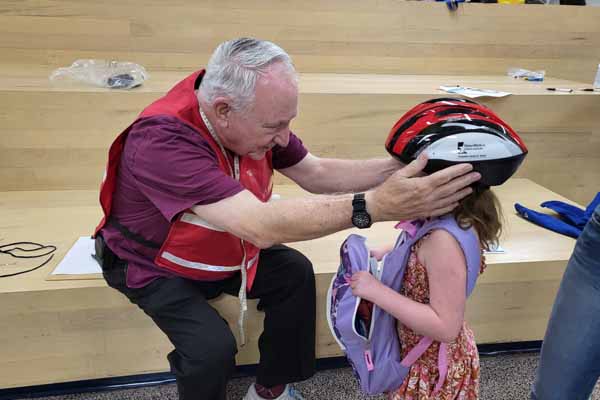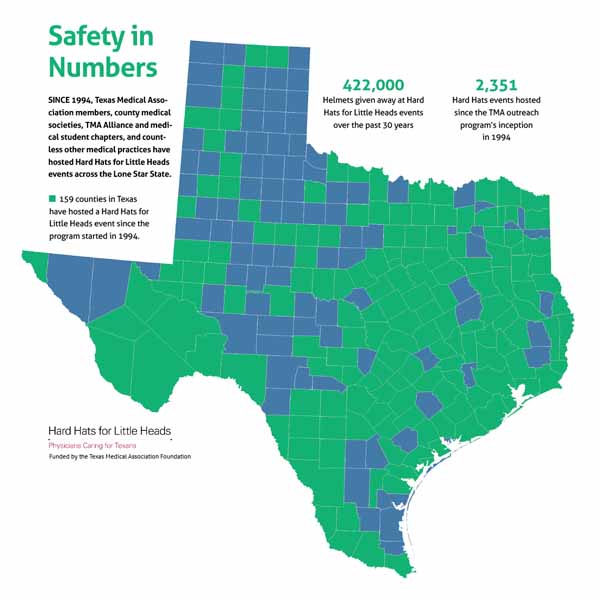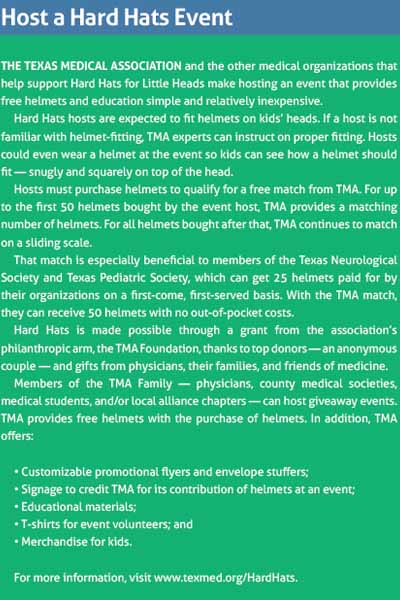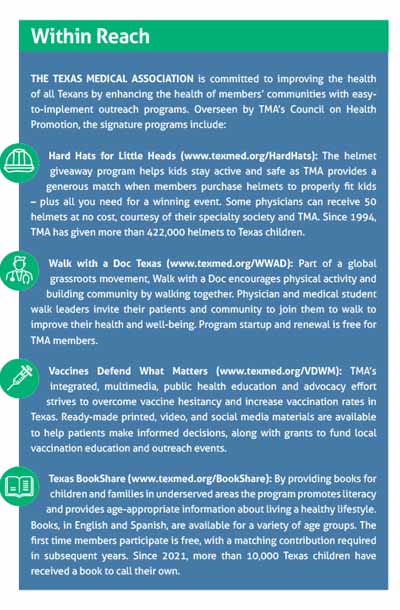
Portland family medicine physician James Mobley, MD, remembers the fear he experienced when his daughter fell from her bicycle as a child and subsequently suffered a concussion – an injury he admits could have been “totally prevented” if she had donned a helmet that day.
“It scared the daylights out of us,” he said. “There’s no reason any child should end up in the emergency room for a lack of head protection.”
Shortly after his daughter’s fall in May 1995, Dr. Mobley began searching for a way to educate his community about head injuries that could occur from accidents from skateboarding, bicycling, inline skating, and riding a scooter.
At the time, Dr. Mobley says helmet wearing wasn’t often considered to be “cool or necessary” among kids and their parents. He says this belief stemmed from a lack of education among the community on brain injuries and how to prevent them, which he was determined to change.
This led Dr. Mobley to the Texas Medical Association’s Hard Hats for Little Heads bicycle helmet giveaway program. Created by then-San Angelo pain specialist and TMA member Larry Driver, MD, the idea was to provide essential safety gear to children and to instruct them and their families on the importance of head protection.
Since its adoption by TMA’s House of Delegates in 1994, Hard Hats has become both TMA’s longest-running outreach program and its most frequently used, giving away more than 422,000 helmets over the last three decades and earning participation from county medical societies, TMA Alliance and medical student chapters, and physicians and medical practices across the state. Hosts are also invited to collaborate with community organizations on events. Overseen by TMA’s Council on Health Promotion, the initiative is one of four signature outreach programs from the association. (See “Within Reach,” page 33.)
What’s more, Hard Hats events frequently garner positive media attention and provide visibility to physicians who often “don’t see their patients outside of the exam room,” said former TMA and TMA Foundation (TMAF) President Mark Kubala, MD, who presided over TMAF during Hard Hats’ first years. TMAF funds the Hard Hats program through many individual donors — including a donor couple who offers a matching gift — and gifts from physicians, their families, and friends of medicine.
“Individually, the patients have a great deal of love and respect for their doctor,” Dr. Kubala, a Beaumont neurosurgeon, told Texas Medicine last year. “But sometimes physicians as a group are not well thought of, and it’s when we do public health [outreach] that the benevolence of physicians comes forward.”
Because of Hard Hats, he says, whole families have begun to prioritize head safety. Over the years of hosting programs – even inspiring a video TMA produced – he frequently has heard young children ask their parents, “If I need to wear a helmet riding my bike, why don’t you?”
The 2019 TMA video recreated Dr. Kubala’s demonstration of dropping melons with and without helmets at bike height level to show the effectiveness of protection.
“It is now common to see [whole] families riding bicycles together and wearing a helmet,” he said. “Once the public began to understand the protective nature of helmets … the use of helmets spread to other sports like skateboarding and snow skiing.”
Dr. Kubala had a similar experience to Dr. Mobley when his son was concussed after colliding with fellow skiers on a Colorado mountain. When his teenage son’s concussion cleared, the boy spoke to his father about the then-new TMA program.
“He told me, ‘You’re right, dad. I see why it’s important to wear a helmet any time you are riding a bicycle or skiing,’” Dr. Kubala recalled. “And I’m happy to say that for 30 years now, we have. The brain does not recover like other parts of the body. A bone may grow back; the brain doesn’t.”

Growing the program
Over the past three decades, more than 2,300 Hard Hats events have been hosted by TMA physician members, medical student chapters, and county medical society alliances. Giveaways have taken place in 159 of Texas’ 254 counties. (See “Safety in Numbers,” page 34.)
New Council on Health Promotion chair Houston neurologist Eddie Lee Patton Jr., MD, says traumatic – and preventable – head injuries caused by sports-on-wheels accidents necessitate community programs like Hard Hats.
“We’re talking about horrible, horrible head injuries that stem from these accidents,” he said. “And many of them can be avoided. Every helmet counts.”
Dr. Patton’s goal as council chair is to seek increased participation in TMA outreach programs and to bolster their visibility among members through one-on-one communication and social media outreach.
“It is essential that we [the council] make sure that TMA members know these programs exist,” he said. “When I was exposed to Hard Hats, I didn’t know that it was a TMA-led program. It wasn’t until I became a member of the council that I realized TMA had these resources available.”
For Amanda Mohammed-Strait, MD, adding the Hard Hats program to her community outreach was a natural fit.
A long-time participant of TMA’s Walk with a Doc program, which encourages healthy physical activity through physician-led walks, the Dallas family medicine physician is passionate about giving back to her community. (See “Taking Steps Together,” page 42.)
This year Dr. Mohammed-Strait added another public health program to her résumé by hosting her first Hard Hats event, at which the TMA Council on Health Promotion member gifted 200 helmets to local students. The giveaway provided essential safety gear to those who otherwise would have gone without it and demonstrated proper helmet wearing to students who brought that information home to their parents.
“We provided guided instruction to children on the value of wearing a helmet, and then they were able to further disseminate that information among their peers and families,” she said. “The kids felt encouraged to communicate with their parents or their caregivers on the importance of wearing a helmet when they got home. It felt like the event made a huge impact on their lives.”
TMA Alliance Past President Angela Donahue says her Tarrant County alliance chapter regularly partners with local police departments, medical schools, and Fort Worth’s Cook Children’s Medical Center to host Hard Hats helmet giveaway events across the county.
Ms. Donahue says the iconic red, white, and black Hard Hats helmets stimulate children’s interest in safe-riding techniques.
“Children have always liked how the helmets look, offering an inducement to wear them,” she said. “Sometimes I’ll see a child wearing that helmet around. That shows we made an impact.”

On the rebound
However, Ms. Donahue remembers when Hard Hats hit its lowest giveaway years during the COVID-19 pandemic. From 2020 to 2022, helmet donation plummeted to a 15-year low.
In Tarrant County, the paucity of instruction and gathering opportunities for both physicians and patients left a “social and education black hole in the community,” she said.
“It was really sad. For years, these [Hard Hats] events were increasing in number and popularity across our community, only for the pandemic to put it all on hold. It separated physicians from their patients in a big way and left some children without proper head gear. But we were right back to it once we could all regroup,” Ms. Donahue said.
Despite pandemic delays, the number of helmets given at Hard Hats events has slowly risen since 2022. Although the number is not quite back to pre-pandemic levels, Dr. Patton is hopeful the pandemic inspired those in organized medicine to support TMA outreach and to host their own Hard Hats events. He was responsible for getting his specialty society, the Texas Neurology Society, to sign on as a donor so its members could get the first 25 helmets at no cost.
Dr. Mobley, who has hosted events from Lake Jackson to Brownsville, still sees children come into the clinic with preventable head injuries, but says it has become a less frequent occurrence after years of education and advocacy by organized medicine.
“I’m hosting three events just this week, and happy to hold more. At this point, I’m on call for Hard Hats,” he said. “That’s a testament to how much our community both needs and values this program.”
